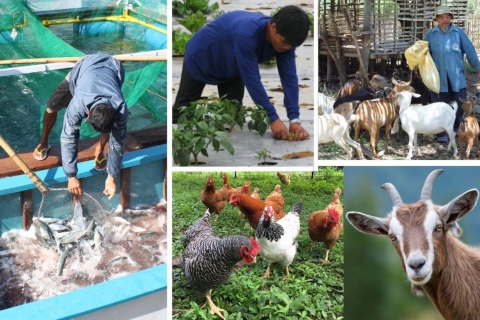To ensure an adequate supply of affordable food and provide farmers, fishers, and their families steady income, the Department of Agriculture (DA) will implement short-gestating farm and fishery projects that will help perk up the country’s economy.
“As we continue to confront the COVID-19 pandemic, we will vigorously implement emergency or short-gestating food production projects in partnership with farmers’ cooperatives and associations (FCAs), the private sector, and local government units (LGUs),” said Agriculture Secretary William Dar.
“In addition to vegetable production, we will promote the raising of native chicken, quail, and goat, including cattle feedlot fattening, and aquaculture, among other agri-livelihood projects that can be harvested, as early as one month and onwards,” the DA chief said.
“The resulting agri-fishery, poultry, and livestock products can be readily sold by farmer and fisher families, giving them a steady source of income and purchasing power to buy other basic commodities and necessities,” said Secretary Dar, adding that “consumer spending must be re-energized to crank up the domestic economy.”
An emergency legislative measure awaiting approval is the ‘Bayanihan 2 economic stimulus’ that aims to pump prime the economy to trigger recovery and growth.
It also includes bankrolling agri-fishery productivity and income-enhancement projects, social protection and amelioration initiatives, and provision of cash assistance to the country’s marginalized sector.
In addition, the Bayanihan 2 will invest in job-creating and cash-for-work projects for displaced workers and unemployed to enable them to procure food and other basic necessities.
“All this will stimulate consumer spending, and that must be supported by sustained food production,” Secretary Dar said.
Meanwhile, the DA will continue implementing the “Kadiwa ni Ani at Kita” marketing program that provides farmers, fishers, and agripreneurs the platform to sell their products directly to consumers at affordable prices.
To date, the various DA-Kadiwa modalities – retail, express, on wheels, and online – have generated a total sale of P6.85 billion nationwide, directly benefiting 18,281 farmers and fishers, 4,453 agri-fishery cooperatives, and close to two million households.
Further, Secretary Dar said the LGUs also play a crucial role by creating demand and buying directly from producers for their food packs and relief distribution.
To date, 442 LGUs have directly procured tons of agri-fishery products from farmers and fishers, amounting to P2.6 billion. ### (Tomas Marquez and Myriam Layaoen, DA StratComms)

